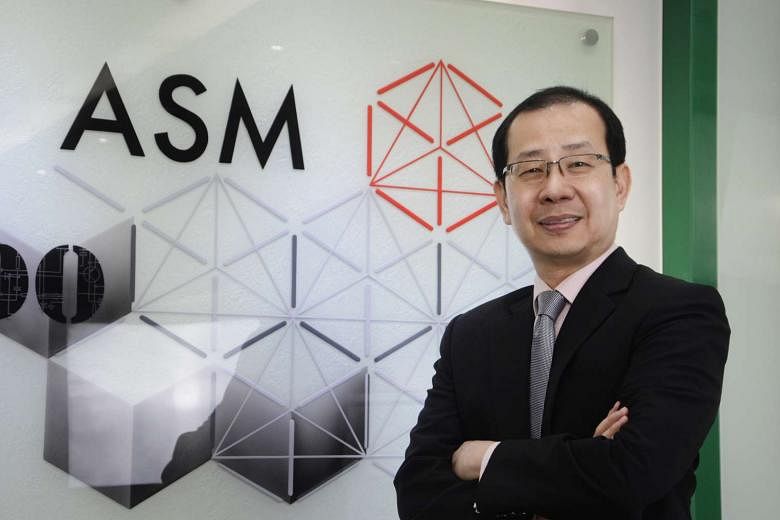Singapore's semiconductor industry has been stuck in a rut over the past few years but prospects are finally looking up.
Companies say they expect demand to improve this year, driven mainly by trends such as the release of new consumer electronic devices and the growing popularity of smart cars.
But even as companies look forward to a stronger year, rising operating costs and mounting international competition remain key concerns and they will have to fight to keep ahead.
Electronics - which makes up a third of Singapore's manufacturing output - has been hit by a protracted cyclical downturn in the country's trade-dependent economy amid lacklustre global growth.
But the sector has been showing signs of bottoming out and appears to be staging a gradual recovery.
Manufacturing output grew 11.9 per cent in November last year, compared with the same month in 2015, lifted by a 24.2 per cent surge in electronics.
-
11.9% Growth in manufacturing output in November last year.
12.8% Growth in electronics output in the first 11 months of last year.
In the first 11 months of last year, electronics output expanded 12.8 per cent, compared with the same period a year earlier.
This growth was driven largely by the semiconductor segment, which saw steady year-on-year expansion every month from March to November. Semiconductors make up about 70 per cent of electronics manufacturing output.
Separately, the Purchasing Managers' Index (PMI) - an indicator of manufacturing activity - for the electronics sector recorded its fifth straight month of expansion last month.
"The electronics cycle is very much tied to consumer demand," said Mr Robin Ng, group chief financial officer of ASM Pacific Technology, the world's largest equipment supplier for the semiconductor and light-emitting diode (LED) industries.
The Hong Kong-listed company employs more than 1,400 workers in Singapore and has its headquarters here.
"We expect the market will be better this year than in 2016. The United States economy seems to be picking up... China is stabilising and Europe seems to be on the path to recovery," he added.
Mr Allen Ang, group managing director of Aldon Technologies, said it has experienced a pick-up in orders since the start of the year.
The company refurbishes parts for flat panel and semiconductor producers.
"The outlook for semiconductors is more optimistic compared with last year... My customers have secured a full load of orders up till June," added Mr Ang, who expects revenue this year to be 10 per cent up from last year's.
Industry players say they are optimistic about the outlook because of both short- and long-term trends driving demand for chips.
Mr Russell Tham, regional president of semiconductor equipment supplier Applied Materials South East Asia, said it expects more business this year as customers invest to keep up with rapidly evolving trends in data storage, mobile devices and display technology.
These technological shifts prompt companies to "upgrade their factories and upgrade their equipment", he noted.
"Our engagements with wafer fabrication plants also indicate that they are fairly optimistic about 2017," Mr Tham added.
The longer-term trends include the emergence of smart cars driving semiconductor demand in the automotive industry and the Internet of Things (IoT), which refers to the network of devices linked to the Internet or to one another.
Mr C. K. Tan, president of the Singapore Semiconductor Industry Association (SSIA), said: "Segments like industrial IoT, new and exciting portable handheld gadgets, new low-cost applications that enable IoT proliferation in healthcare, robotics, augmented and virtual reality, drones and autonomous vehicles will provide the base for growth in the sector."
Mr Tham agreed: "There is a whole range of technologies which will drive new demand over the next three to five years."
But costs remain a key concern in the semiconductor market, where margins are thin and global competition is keen.
"For my customers, cost is still a very big issue," said Mr Ang, who noted that clients are increasingly opting for higher-quality components to avoid spending money on frequent replacements.
"The competition they face is no joke, especially from wafer fabs in China, where capacity and technology are picking up very fast," he added.
An executive at a semiconductor assembly and testing firm who declined to be named noted that China has been investing heavily in building wafer fabrication plants for smaller, increasingly complex chips.
Singapore plants, which operate in a high-cost environment, face mounting competition and are "lagging in investment and technology", he noted, adding that he is not optimistic about prospects for the industry here.
Still, others are confident that Singapore-based companies will remain resilient by moving up the value chain.
"The semiconductor and electronics industry in Singapore is fundamentally already subject to global competition," said Mr Tham.
"We're at a stage where those that are extremely cost-sensitive have already moved elsewhere... Business costs may not be the primary consideration for companies with a presence here."
SSIA's Mr Tan said Singapore is still an attractive location for global companies looking to site key functions like regional hubs, headquarters, design teams and supply chain management.
"What is needed now is to ensure this ecosystem continues to strive in productivity and innovation, to be more relevant and upscale itself to support higher-end products and global requirements," he added.


